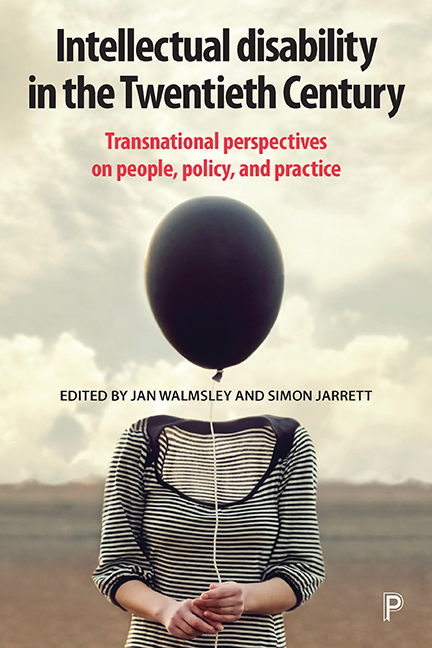 Intellectual Disability in the Twentieth Century
Intellectual Disability in the Twentieth Century Book contents
- Frontmatter
- Contents
- Notes on editors and contributors
- Introduction
- one Paradoxical lives: intellectual disability policy and practice in twentieth-century Australia
- two Tracing the historical and ideological roots of services for people with intellectual disabilities in Austria
- three Time of paradoxes: what the twentieth century was like for people with intellectual disabilities living in Czechoslovakia/Czech Republic
- four Intellectual disability in twentieth-century Ghana
- five A Greek Neverland: the history of the Leros asylums’ inmates with intellectual disability (1958–95)
- six Intellectual disability in Hong Kong: then and now
- seven People with intellectual disabilities in the European semi-periphery: the case of Hungary
- eight People with intellectual disabilities in Iceland in the twentieth century: sterilisation, social role valorisation and ‘normal life’
- nine Institutionalisation in twentieth-century New Zealand
- ten ‘My life in the institution’ and ‘My life in the community’: policies and practice in Taiwan
- eleven Intellectual disability policy and practice in twentieth-century United Kingdom
- twelve From social menace to unfulfilled promise: the evolution of policy and practice towards people with intellectual disabilities in the United States
- Index
three - Time of paradoxes: what the twentieth century was like for people with intellectual disabilities living in Czechoslovakia/Czech Republic
Published online by Cambridge University Press: 27 April 2022
- Frontmatter
- Contents
- Notes on editors and contributors
- Introduction
- one Paradoxical lives: intellectual disability policy and practice in twentieth-century Australia
- two Tracing the historical and ideological roots of services for people with intellectual disabilities in Austria
- three Time of paradoxes: what the twentieth century was like for people with intellectual disabilities living in Czechoslovakia/Czech Republic
- four Intellectual disability in twentieth-century Ghana
- five A Greek Neverland: the history of the Leros asylums’ inmates with intellectual disability (1958–95)
- six Intellectual disability in Hong Kong: then and now
- seven People with intellectual disabilities in the European semi-periphery: the case of Hungary
- eight People with intellectual disabilities in Iceland in the twentieth century: sterilisation, social role valorisation and ‘normal life’
- nine Institutionalisation in twentieth-century New Zealand
- ten ‘My life in the institution’ and ‘My life in the community’: policies and practice in Taiwan
- eleven Intellectual disability policy and practice in twentieth-century United Kingdom
- twelve From social menace to unfulfilled promise: the evolution of policy and practice towards people with intellectual disabilities in the United States
- Index
Summary
Introduction
The twentieth century was marked by a number of political and policy shifts that impacted the lives of people with intellectual disabilities and their families. Some were worldwide (eg two World Wars), while others (eg the onset and fall of totalitarianism) were specific to the Czech Republic, but all influenced perceptions of and attitudes towards people with intellectual disabilities.
The authors use the terminology in use at the time, to keep the chapter historically accurate. Readers will encounter outdated terms: ‘feeble-minded’, ‘idiots’, ‘mentally handicapped’. As Sinason commented, it is ‘doing a grave disservice to past pioneers to point contemptuously to their chosen terms. Within another five years, the process of euphemism will already be affecting the brave new words’ (Sinason, 2010, 35).
Antecedents: pre-twentieth century
Approximately three hundred and fifty years ago, Czech scholar Comenius (1592–1670) said that no human being is beyond the power of education. Little did he know how many people would declassify this thought, and for how many people it would become hope and inspiration. Comenius’ belief that it was not possible to find a person of such mental incapacity for whom education would not bring any improvement at all was, however, long to be fulfilled. It wasn't until the nineteenth century, when the first specialised institutions were built, that society began to seek a humanly reasonable relationship towards people with intellectual disabilities. Although these institutions were segregated, education was introduced to assist people in developing self-care and work habits.
The first institution in the Austro-Hungarian Empire, the ‘Institution of Idiots’, was founded by physician and educator Karel Slavoj Amerling (1807–84) in 1871. Amerling combined medical and educational interventions (Herfort, 1932). He created an education system graded according to the level of intellectual disability, rather than age. He built on students’ prior knowledge in teaching. The curriculum included craft instruction. The goal was to return the child to family care, or to support him/her to be successful in adulthood by acquiring manual work skills. Amerling introduced music therapy (Černá et al, 2008), and prohibited physical punishment.
The possibilities of education for the feeble-minded (1900–18)
Around 1900, the idea of compulsory education for children with mild intellectual disabilities within the existing school system arose. Teachers, physicians, social workers and officials sought a way to help these children to use their knowledge and skills.
- Type
- Chapter
- Information
- Intellectual Disability in the Twentieth CenturyTransnational Perspectives on People, Policy, and Practice, pp. 53 - 66Publisher: Bristol University PressPrint publication year: 2019
